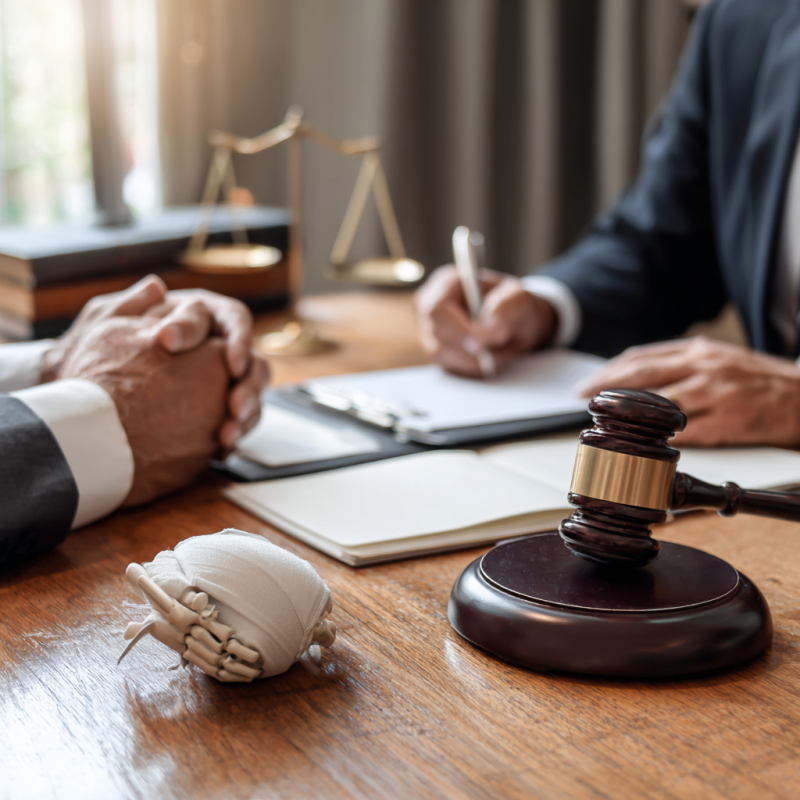How do I know if I need a personal injury lawyer

Understanding when to seek legal help: How do I know if I need a personal injury lawyer
When you’re recovering from an accident or facing unexpected medical bills, it’s natural to ask, “How do I know if I need a personal injury lawyer?” You might feel confident handling a claim yourself—or unsure whether legal guidance would improve your outcome. Fortunately, there are practical ways to determine if hiring an attorney can protect your rights and maximize your compensation.
How do i know if i need a personal injury lawyer
Personal injury law covers cases where you have suffered harm due to someone else’s negligence, such as car accidents, slip-and-falls, or defective products. If you are dealing with broken bones, repeated hospital trips, or emotional distress, the question about whether you need a lawyer may be top of mind. According to some insurance industry estimates, individuals who hire an attorney often see larger settlement offers because legal representation shows that you are taking the process seriously. It is not a guarantee, but it signals that you are prepared to demand full compensation.
You might also be in a position where an insurance company is pushing you to accept a lower payout. Insurers regularly rely on data, so when they see that a claimant is backed by a lawyer, they sometimes adjust their approach to avoid lengthy litigation. On the flip side, if your injuries are minimal and you have a straightforward medical report, you might handle a simple claim on your own. The key is understanding whether potential complexities in your case would benefit from professional guidance.
Assess your injury’s severity, the clarity of evidence, and your own comfort dealing with paperwork. If the accident led to lost wages, long recovery, or high medical costs, legal counsel is often worth it. By taking the time to learn more, you can decide whether your case merits the expertise of a personal injury lawyer or can be resolved independently.
Understand the lawyer’s role
A personal injury lawyer works to represent your interests during negotiations with insurance companies or through court proceedings. This process includes researching case law, gathering medical records, interviewing witnesses, and calculating damages. In other words, an attorney aims to prove liability (who is at fault) and then show the extent of your losses so you can seek fair compensation.
If you are curious about the specifics of what your attorney might do on a day-to-day basis, you can check out what does a personal injury lawyer do. You will find that much of their time goes toward aspects like:
- Investigating accident details to build a strong foundation
- Communicating with insurance companies to avoid low-ball offers
- Preparing legal documents and meeting court deadlines
- Advising you on settlement offers, courtroom behavior, and trial strategy
In addition, an attorney’s role is to explain your legal options in clear language. You will learn whether settlement, mediation, or a full trial might be best for your situation. This guidance can be especially valuable if you feel overwhelmed by complicated forms or jargon. While a lawyer cannot predict the exact outcome, their experience can give you clarity on whether your case is strong enough to pursue.
Several studies show that clients often appreciate having a single point of contact who coordinates everything. This personal touch can free you to focus on recovering, returning to work, or caring for family. A good attorney strives to keep you updated and comfortable, so you know where your case stands.
Look for vital signals
Not every bump or bruise calls for legal help, but certain signs may point you toward professional counsel:
- Multiple or severe injuries.
- Serious injuries like fractures, head trauma, or long-term treatment usually mean higher medical bills. A 2024 survey from a regional legal association found that complex claims involving permanent injuries had a 32% higher settlement when legal advisors were involved.
- Disputed fault.
- If the other party or their insurance carrier denies liability or blames you, it raises the complexity. Hiring an attorney can help gather evidence, such as camera footage or witness statements, to show who truly caused the incident.
- Unclear insurance coverage.
- Handling a claim with multiple insurer policies, uninsured motorists, or overlapping policies can be tricky. A lawyer helps you identify all potential sources of compensation.
- High financial stakes.
- If your job requires physical labor, any injury could lead to extended time off or permanent disability. In these situations, professional guidance can protect your livelihood.
- Unfair settlement offers.
- Insurance companies often test lower offers to see if you will accept quickly. An attorney can push for a fairer amount based on the full extent of your injuries.
These signals do not guarantee you must hire someone, but they highlight areas where professional insight adds value. If you see one or more of these red flags in your case, you may benefit from speaking to a personal injury lawyer. Sometimes, an initial consultation is free, so you can gather information without committing on the spot.
Compare costs and rewards
The cost of hiring an attorney can be a major concern, especially if your finances are already tight because of medical expenses or missed paychecks. A common arrangement for personal injury cases is the contingency fee model, which means you only pay if you win or settle. You can get more details about typical payment structures in how much does a personal injury lawyer cost.
Often, contingency fees fall in the 25% to 40% range of the total settlement or court award. That may sound substantial, but many people find that having representation leads to a higher net payout even after fees. If you want a deeper breakdown of fee percentages, what percentage do personal injury lawyers take can help clarify how these splits typically look.
Beyond the financials, the peace of mind an attorney can offer is also valuable. When you hire an experienced lawyer, you shift the stress of dealing with insurers and legal procedures off your shoulders. This can be especially helpful if you have ongoing medical treatments or therapy sessions. Knowing that a professional has your back lets you put more of your energy into healing.
However, if your injuries are minor and you did not incur major medical bills or extended lost wages, you might handle a simple claim by yourself. The goal is not to push you into legal help you do not need, but rather to empower you so you can make an informed decision.
Consider claim timelines
Personal injury lawsuits can take anywhere from a few months to several years, depending on how complex the case is and how cooperative each side is in negotiations. If your case is straightforward, you might wrap up quickly. More complicated cases, such as those involving multiple defendants or severe injuries, may take longer. You can find additional details in how long does a personal injury lawsuit take.
Realistically, you want to consider whether you have the patience, time, and emotional energy for extended negotiations or a trial. If you suspect your case will drag on, having a lawyer navigate discovery requests, court calendars, and settlement discussions may save you a lot of frustration.
An attorney will usually try to settle a case if it benefits you. Settlements reduce legal expenses and provide quicker resolutions. But, if the other side refuses to pay what you deserve, your case could proceed to trial. At that point, having legal counsel is nearly essential.
How do I know if I need a personal injury lawyer: Final thoughts
You do not have to go it alone, especially if your injuries are serious or the other side is pushing back on your claim. Ask yourself how much you can handle on your own. Do you feel comfortable negotiating and collecting evidence? If not, a personal injury lawyer’s support might help you get the compensation you need for medical bills, lost wages, and any ongoing treatment. Even if you only meet for a consultation, you will learn enough to make a confident decision.
Remember, the question “How do I know if I need a personal injury lawyer?” is often resolved by looking at how complex your claim is and whether you can realistically manage the tasks involved. When in doubt, professional guidance can protect your rights and free you to focus on healing.
Get Help Now: Talk to a Personal Injury Lawyer Today
Not sure how to move forward? Schedule a free consultation and get answers to your most important question: How do I know if I need a personal injury lawyer? Don’t leave money on the table or risk missing critical deadlines. Get help now and protect your rights.
Frequently asked questions
1. Can I handle my own personal injury claim?
Yes, you can if your injuries are minor and your medical bills are relatively small. In that case, straightforward claims might be settled directly with an insurance company. However, if you have severe injuries and a complicated scenario, legal representation could be a better fit.
2. Is it expensive to hire a personal injury lawyer?
Many personal injury lawyers work on a contingency fee basis, so they only get paid if you win or settle your case. The fee usually ranges between 25% and 40% of your settlement or award. It is a system meant to reduce your out-of-pocket costs.
3. How long do most personal injury cases take?
Many simple cases can be resolved within a few months if liability is clear and negotiations go smoothly. More complex cases involving significant injuries or disputes over fault may stretch out for a year or longer. Settlement negotiations often speed things up, but a trial can add extra months or even years.
4. What if I share fault for the accident?
Partial fault does not always eliminate your chance for compensation. In many places, you can still recover a portion of damages, depending on how much of the accident was deemed your responsibility. An attorney can clarify how this applies to your specific situation.
5. What does a free consultation usually cover?
A free consultation typically lets the lawyer review the basic facts of your case, discuss possible strategies, and see whether you might work well together. You can use this time to ask questions about their background, fees, and approach before deciding to hire them.
6. Is mediation an option instead of going to trial?
Yes. Mediation, a structured negotiation led by a neutral third party, can be a less stressful and quicker way to resolve disputes. Lawyers often recommend mediation if both sides want to avoid the time and cost of a trial.
7. Do I always need to file a lawsuit?
Not necessarily. Plenty of personal injury claims settle through negotiations or mediation without an actual lawsuit. Filing legal papers might be the next step if the other party is uncooperative or offers too little compensation.
Key takeaways
- Serious injuries or disputes about fault often indicate you might need legal support.
- A personal injury lawyer can manage negotiations, gather evidence, and handle complex procedures.
- Contingency fee structures ease the burden of paying legal fees upfront.
- Timelines vary, ranging from a few months for simple claims to years for more involved cases.
- Free consultations offer a low-risk way to decide if hiring an attorney is right for you.
